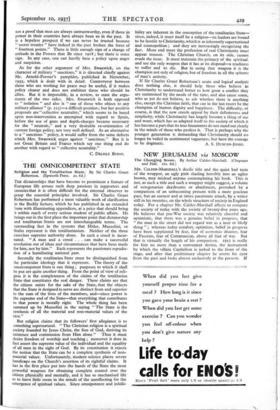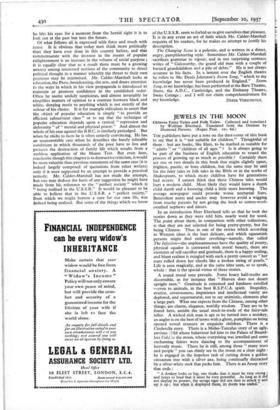NEW JERUSALEM via MOSCOW
The Changing Scene. By Arthur Calder-Marshall. (Chapman and Hall. los. 6d.)
MR. CALDER-MARSHALL'S docile title and the quiet bad taste of the wrapper, an ugly pink shading horribly into an uglier brown, may mislead anyone contemplating his book. This is not, as such a title and such a wrapper might suggest, a volume of octogenarian daydreams or abashment, provoked by a comparison of an unbecoming present with a more gracious past, but an earnest and at times passionate attack, by a writer still in his twenties, on the whole structure of society in England today. For a chapter Mr. Calder-Marshall affects to compare the society of today with the society of twenty-five years ago. He believes that pre-War society was relatively cheerful and optimistic, that there was a genuine belief in progress, that "the man in the street did not regard war as a near or likely thing " ; whereas today comfort, optimism, belief in progress have been supplanted by fear, fear of economic disaster, fear of Fascism, fear of Communism, above all fear of war. But that is virtually the length of his comparison. 1912 is really for him no more than a convenient device, the instrument by which the villain Capitalism is jerked to the front of the stage, and after that preliminary chapter he averts his eyes from the past and looks almost exclusively at the present. If
he lifts his eyes for a moment from the horrid sight it is to look not at the past but into the future.
Of what follows all is expressed with force and much with sense. It is obvious that today men think more politically than they have ever done in this country before, and that commensurate with the increase in the means of popular enlightenment is an increase in the volume of social purpose ; it is equally clear that as a result there must be a growing anxiety among interested sections of the community to direct political thought in a manner whereby the threat to their own positions may be minimised. Mr. Calder-Marshall looks at education, the Press, broadcasting, the arts, and draws attention to the ways in which in his view propaganda is introduced to maintain or promote confidence in the established order. Often he seems unduly suspicious, and almost invariably he simplifies matters of opinion to a contrast between black and white, denying merit to anything which is not exactly of the colour of his choice. It is for example ridiculous to assert that the object of popular education is simply "to provide an efficient subservient class" or to say that the technique of popular education depends upon a cynical "repression and deformity " of" mental and physical power." And almost the whole of his case against the B.B.C. is similarly prejudged. But when he sticks to facts he is often entirely convincing. He has an unanswerable case when he describes the barely tolerable conditions in which thousands of the poor have to live and pictures the destruction of family life which results from a ruthless application of the Means Test. But even here, conclusive though this chapter is as destructive criticism, it would be more valuable than previous statements of the same case (it is indeed largely composed of quotations from other writers) only if it were supported by an attempt to provide a practical remedy. Mr. Calder-Marshall has not made the attempt, but one may deduce the basis of any suggestion he might have made from his reference to the "perfect society" which is being realised in the U.S.S.R." It would be pleasant to be able to believe that in the U.S.S.R. a "perfect society," from which we might borrow a cure for our own ills, was indecd being realised. But some of the things which we know
of the U.S.S.R. seem to forbid us to give ourselves that pleasure.
• It is in any event an act of faith which Mr. Calder-Marshall requires of his readers, for he makes no attempt to justify his description.
The Changing Scene is a polemic, and is written in a direct, angry, pamphleteering style. Sometimes Mr. Calder-Marshall sacrifices grammar to vigour, and in one surprising sentence writes of " Galsworthy, the grand old man with a couple of bastard grandchildren and a pile of debts." He is not always accurate in his facts. In a lament over the English theatre he refers to Mr. Denis Johnston's Storm Song," which to my knowledge has never been produced in England." Storm Song, to my knowledge, has been performed at the Barn Theatre, Shere, the A.D.C., Cambridge, and the Embassy Theatre, Swiss Cottage ; and I will not claim comprehensiveness for











































 Previous page
Previous page